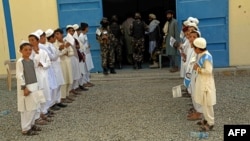Caught between the Taliban's gender politics and a lack of foreign funding, the public education sector in Afghanistan faces the risk of collapse, aid agencies warn.
At least $1.5 billion is required annually to keep public schools open for millions of students, to pay salaries and provide other essential educational resources, but the war-torn country is unable to provide that amount on its own.
Facing international sanctions, Afghanistan's de facto Taliban government has set a national budget of about $2.6 billion this year, which already suffers from a nearly $500 million deficit.
"Approximately 187,000 teachers will need salary support to avoid a total collapse of the education system," Ashiqullah Mandozai, a spokesperson for Save the Children in Afghanistan, told VOA.
"The new MoE [Ministry of Education] has indicated that they can only pay salaries for 30% of the current work force, which underlines a precarious position for public infrastructure without development funding," Mandozai said.
Foreign donors have stopped development funding for Afghanistan, including to the public education sector, since the Taliban seized power last year but have maintained humanitarian assistance, mostly to avert mass hunger in the country.
Donors also strongly disagree with the Taliban's educational policies, particularly with the closure of secondary schools for girls.
"Between the Taliban's bad politics and a lack of donor funding, Afghanistan's education system is being decimated," said Ghulam Mohammad Fida, director of Afghan Education for a Better Tomorrow, a California-based nongovernmental organization.
The U.N. says Afghanistan's education system has been devastated by decades of sustained armed conflicts, and almost 4 million Afghan children are already deprived of schooling.
In January and February, the U.N. children's agency (UNICEF) paid Afghan teachers a support salary of $100 per person but stopped the payments after the Taliban reneged on their pledge to reopen secondary schools for girls in March.
"The system is undoubtedly strained, and the increased demand for education across the country will require additional support to ensure that children are able to access learning," Joe English, a UNICEF spokesperson, told VOA.
Schools closed, transformed
Secondary schools for girls in most parts of Afghanistan have been closed for more than a year as Taliban authorities say they are waiting for a verdict from religious scholars on the reopening of schools for all girls.
Despite widespread domestic and international condemnation, the Taliban have not indicated when or whether these schools will reopen.
"Depriving girls of secondary education translates to a loss of at least $500 million to the Afghan economy in the last 12 months," UNICEF said last month.
Moreover, the Taliban are increasingly transforming public schools into religious seminaries by overhauling the educational curriculum, hiring clerics as teachers and principals, and discouraging female participation in the educational system.
The "USAID [U.S. Agency for International Development] also expressed concern about the conversion of public school buildings, specifically technical and vocational education and training centers and teacher-training colleges, to madrassas. Hours of instruction allocated to religious studies have also reportedly been increased during the quarter," the U.S. government's Special Inspector General for Afghanistan Reconstruction reported to Congress in July.
Senior Taliban officials, such as the minister for higher education, have publicly berated modern education and have vowed for a strict Islamization of Afghanistan's educational system.
Made up entirely of male Islamic clerics, the Taliban's de facto government has failed to earn recognition from any country in the world as it faces universal condemnation for its extremist policies.
In response, Taliban leaders say they are accountable only to God and that the leadership will never budge on its pure Islamic governance.







